Episodes
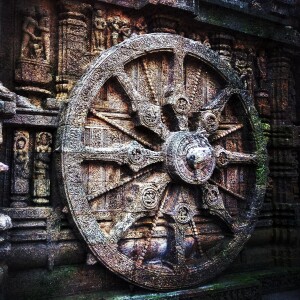
Tuesday May 09, 2023
Tuesday May 09, 2023
Jeffery D. Long spoke to me last year about religious pacifism, especially in reference to the brand-new book he co-edited (and wrote chapters for), Nonviolence in the World’s Religions: A Concise Introduction (Routledge, 2022).
Now, the Carl W. Ziegler Professor of Religious Studies at Elizabethtown College talks to me about a book coming out this year: Discovering Indian Philosophy: An Introduction to Hindu, Jain, and Buddhist Thought (Bloomsbury, coming 2023). It’s a sneak peek! And I am incredibly interested in the topic. I have delved into Buddhism, which had its start in India way back when. And I’ve been fascinated by the study of Americans who brought Eastern philosophy and religion back with them in the back half of the 20th century.
Long, however, a convert to Hinduism, wanted to do his part of help place Indian philosophy not only in its place in world religion, but in the Philosophy Department proper.
What can we learn about what we think and how we think from the great traditions of the Indian subcontinent without silo-ing those ideas just in religion?
I was hungry to learn, and Long thrilled me with answers to questions I didn’t even know I had ...
Photo by Navneet Shanu

Tuesday May 02, 2023
Tuesday May 02, 2023
There is a joy that comes with interviewing someone about something you are deeply familiar with. You have lots of follow-up questions. You have lots of chances to push back. You know what to joke about to show inside knowledge and how to carry the interviewee deeper and deeper into the shared pool.
There is another joy that comes with interviewing someone about something you know nothing about. Well, OK, to be fair, Adam Gray and I both teach languages, and we both play video games (check out his podcast here).
But Taiwan? Nothing. I got nothing. It's off the coast of China? There's some disagreement about who should be in charge of it, and what that looks like? That's it.
So, I was delighted to get Adam's immigrant take. He has spent 16-ish years teaching “cram school” there, where students finish up their day at regular school then spend hours in the afternoon and evening in English immersion classes with Adam and thousands of other teachers around the island.
So, I get to learn from Adam what it’s like to leap into a new country with a new career, live overseas for more than a decade, wrestle with the Chinese language, explore Chinese and Taiwanese politics as a bystander, and, generally, enjoy and flourish living in a new country.
Adam’s got a voice for radio, answers every question I have, and seems like a bright example of a success story on a career path that many English speakers, all over the world, dive into: teaching your native language around the world.
We end on a discussion about something I find particularly interesting: the generational changes, as parents who went through strict and stressful education want their kids to have it easier, but wind up, maybe, making it harder for their kids to learn what they need to know.
Image of Kaohsiung City in Taiwan by tingyaoh from Pixabay
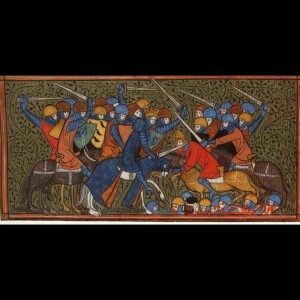
Tuesday Apr 25, 2023
Tuesday Apr 25, 2023
I spoke to a veterinarian-and-amateur-historian recently, and he turned me onto the Crusades. I’ll admit, I hadn’t thought much about them beyond the basic line: zealous Christians from Europe led failed (and very bloody) military attempts to hold Jerusalem and other parts of Jesus' old stomping grounds. The leaders, I remembered, were surely motivated by greed and holy-war violence.
Not so fast, says professor emeritus John France. The truth of things is more nuanced and multifaceted, but, yes, still very violent and bloody. But this medieval historian argues compellingly that, well, we forget, as moderns, just how bloody medieval Europe was—how violence was a common experience for generation after generation there. France was there in academia for a slow sea change in medieval history, where they revisited the myth that all these crusaders were hungry for power and gold. (They actually spent a lot of their own money on these religious excursions.)
Find out what you didn’t know about the Crusades with the brilliant professor emeritus from Swansea University in Wales, the delightful and thoughtful John France ...
To Feed Further Curiosity:
I have been reading an edition of The Concise History of the Crusades by Thomas F. Madden. It has a lot of names and locations that are hard to track, and it goes by pretty fast, but Madden writes with an excited, passionate voice and carries me through the moments when I get lost and hope to find purchase in the timeline again. Most illuminating are the different reasons and results of the separate crusades and groups gathered up under the umbrella of “crusading.”
France credits Jonathan Riley-Smith (The First Crusade and the Idea of Crusading) with helping to change the vision of the Crusades from ruthless power grab to a more nuanced take.
France himself has written some academic books covered here. If you really want to go down the rabbit trail of medieval military tactics and history, France mentions De Re Militari.
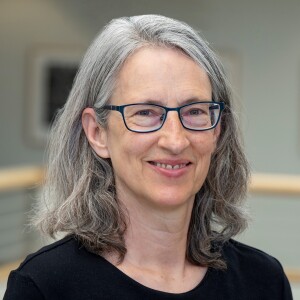
Tuesday Apr 18, 2023
Tuesday Apr 18, 2023
The very kind academic Monica Kirkpatrick Johnson answered questions about teenagers in society last year on this podcast. At the time, she told me she was a helping hand in research done right at the beginning of the COVID pandemic, say, March 2020.
The research had to do with social norms, Dr. Kirkpatrick Johnson told me, and her colleague—Washington State University sociology professor Dr. Christine Horne—could tell me more.
Well, she did.
Dr. Horne and I discuss sociology, American culture, a little about her biggest bit of research (bridewealth, paid from groom's family to bride's family, in Ghana), and a lot about the research she did about brand-new social norms that developed, in real time, during the pandemic in 2020.
What are social norms? Are they good or bad … enervating or oppressive … both? And how did Democrats and Republicans judge each other for their choices about mask-wearing, vaccine-taking, shopping and store-closing during the pandemic?
You’re not done with COVID until you’ve done a little reflection and processing with us …
To feed further curiosity:
Read one of Dr. Horne's co-written bridewealth research papers here.
Read the abstract for Dr. Horne’s COVID paper here.
Note: There’s some weird crinkling on some of this audio. I think, maybe, a camera was focusing in and out, and you could hear it on the mic. Honestly, I am becoming increasingly fascinated by the live sound artifacts that get captured electronically. Sorry about that. But, y’know, this podcast is free, so beggars can’t be choosers. And Dr. Horne is so interesting, I’d listen to her thoughts on society and sociology through a loud wind storm. YMMV.
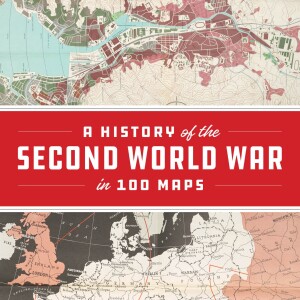
Tuesday Apr 11, 2023
Tuesday Apr 11, 2023
Retired historian Dr. Jeremy Black has now allowed me to interview him three times. THREE TIMES. He gets an award for entertaining my curiosity.
In each interview, he dances through a historian’s perspective and answers both detailed questions about fiddly bits of the world’s past as well as giving detailed and thoughtful big-picture answers about war, religion and life in general.
In this episode, Jeremy discusses A History of the Second World War in 100 Maps (2020, The University of Chicago Press). He kicks off by explaining some wanted the book to be yet another chronological map book (1939, 1940, etc., etc.), but he pushed back to organize it along thematic threads and made sure many countries’ maps were represented.
Interested in history, maps, World War II, propaganda, racism, why German Nazis weren’t as great as some say they were (including themselves), and, lastly, why we ignore old-fashioned weapons like artillery in favor of obsessing over drones? Jeremy Black will interest you.
P.S. Jeremy likes maps so much, he’d make a map book a year (he’s already got a rail map idea). Publishers, he’s proven his prolific output (he has published 11 history books in 2022 alone).
Caveat: There’s a delightful grandfather clock chiming a few minutes in. I left it in, because the chiming is really charming. Why am I suffering with these terrible smartphone beeps when the time could be announced in this way in my own apartment?
To Feed Further Curiosity:
Jeremy talked with me about Agatha Christie and Sherlock Holmes here. He talked about the big picture of war throughout human history here.
Jeremy recommends other books of his at the end of the podcast. Here are some samples from his corpus:
A Short History of War (I read it; I liked it)
Strategy and the Second World War
Rethinking World War Two: The Conflict and Its Legacy
I talked about maps (and old books) with college professor John Krygier here.
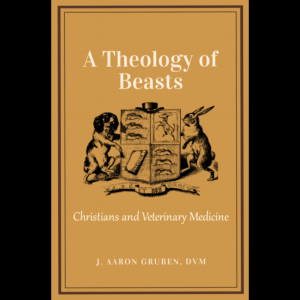
Tuesday Apr 04, 2023
Tuesday Apr 04, 2023
I regularly search on Amazon for “veterinary business” and “veterinary management” and “business” books. Sometimes to buy, but usually, at first, to find new guests for a veterinary podcast.
That’s how I stumbled into Aaron Gruben’s new book A Theology of Beasts: Christians and Veterinary Medicine. The book brought together two things that fascinate me: DVMs and divinity. I bought it. I read it. I liked it.
The first half of the book is Dr. Gruben’s deep dive into Christians he found in ancient and modern history who contributed to and focused on animal medicine. The back half is a collection of some philosophy and theology that Dr. Gruben has looked into that touch on how Christians can think about their place in the world as women and men of God whose ministry could include healing animals, soothing animals’ suffering, and modeling love for Creation to their clients.
Those who might enjoy the book? Christian veterinarians, Christian pet owners, Christian agriculturalists, Christians with horses (early vet med is a lot of horses), and Christians with teenagers thinking about a career in veterinary medicine.
Those who will enjoy the podcast? Anyone curious about vet med, animals and religion.
Let’s dive in …
To Feed Further Curiosity:
Dr. Gruben also writes time travel fiction and has developed curriculum focusing on chivalry. Chivalry, I wondered. Tell me more. So I asked, and he delivered, including book recommendations for someone who knows next to nothing about the Crusades. Then the author of one of the books Dr. Gruben read about the Crusades agreed to do a podcast interview with me. And then Dr. Gruben wrote me some questions to get me started in my interview with the guy who wrote the book Dr. Gruben liked. Convoluted? Sure. Amazing synchronicity? Heck yeah. That podcast interview, hopefully, will be coming soon ...
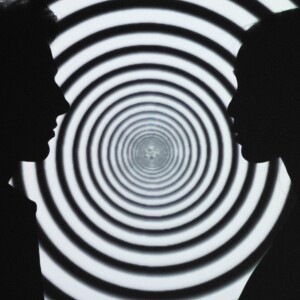
Tuesday Mar 28, 2023
Tuesday Mar 28, 2023
There is the hypnosis done for entertainment—on the stage or in a room of conference-goers. Like, say, this. A hypnotist gathers a group, asks the members to relax, and watches them, with their eyes closed, to see if they’re receptive to the hypnosis. The hypnotist kicks out the ones who are “faking it” or aren’t relaxing. Then the others cluck like chickens or get hot or cold or act silly.
There is another hypnosis, built on the same principles, used as a therapy technique. Ray has used hypnotherapy to help people stop smoking, give up other bad habits, and explore their trauma. That’s the front half of this podcast episode.
In the back half of this episode, we wander into a world less scientific, more “woo woo” and still wickedly fascinating: hypnosis used for past life regression. A woman on Oprah.com wrote about her good experience trying it. A professor at University of Virginia wrote about his concerns about its use. Here’s the Wikipedia article on it. Decide for yourself.
However, I’d urge you to listen to Ray’s poignant account of her very real, very felt experience from past life regression that gave her some insight into her irrational love of water and her obsession with certain colors.
Oh, my experience with hypnosis? I went on two dates with a nice Jewish woman years and years ago, and our first date was to a comedy hypnotist show. I volunteered. She did not. I sat, closed my eyes, and followed the hypnotist’s directions. Breathe this way. Breathe that way. You’re hot. You’re cold. You feel this way. You feel that way. I never felt lost or out of sorts—I was happy doing whatever the hypnotists. But I was always myself; I never lost myself. And that’s how Ray talks about hypnosis. You need to want to be hypnotized, which means you’re not out of control. You’re aware of what’s going, and you’re allowing it to happen. Some people can do it. Some people, in that moment, aren’t ready. Some people hate that.
Caveat: I step on Ray’s introduction (“My name is Ray”), because I’m blathering about some other person’s introduction when we get started. That’s all. Apologies.
To Feed Further Curiosity:
If you want to know more about hypnotherapy, Ray recommended, hey, just go search “hypnotherapy” on the internet and evaluate things yourself. If you want to know about its use in past life regression, do the same thing. But she said she did like a particular book on past life regression, Many Lives, Many Masters, by psychiatrist Dr. Brian L. Weiss.
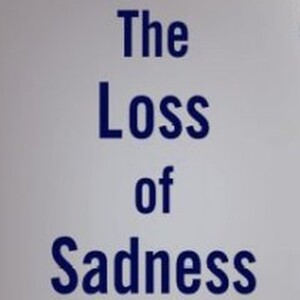
Tuesday Mar 21, 2023
Tuesday Mar 21, 2023
Everybody’s talking about mental health these days. That's, by and large, a good thing.
But did you ever wonder why the incidence of diagnosed depression has been skyrocketing even as we talk more openly about our mental and emotional issues? What's going on?
That’s what I talk to retired professor emeritus Dr. Allan Horwitz about. Dr. Horwitz has tilted at the DSM (The Diagnostic and Statistical Manual of Mental Disorders) windmill with books like All We Have to Fear: Psychiatry’s Transformation of Normal Anxieties into Mental Disorders (2012) and The Loss of Sadness: How Psychiatry Transformed Normal Misery into Depressive Disorder (2007). It was that 2007 book that caught my eye recently. In it, Dr. Horwitz and Dr. Jerome Wakefield argue that in the late 20th century, the psychiatric community chose to remove context from its depression diagnoses. Despite centuries (millennia even) of ancient thought and modern psychiatric approaches to anxiety, sorrow and depression that poignantly considered and recognized how great sadness could be an orderly, normal response to terrible circumstances (romantic breakup, divorce, death, illness and other rough life events), American diagnosticians chose in editions of the famous and widely used DSM to ignore almost all context for painful episodes of sadness (save a short period of time for grief after the death of a loved one).
Drs. Horwitz and Wakefield made the pitch to the psychology and medical community that terrible sadness sometimes might be a normal, healthy response in some cases, not a disordered response needing immediate medical intervention … and, of course, pills.
To boil it down: Sometimes you feel bad about life, but you should feel bad about life, because life, in that moment, is bad and hard and hurtful. You may not be crazy! You may be functional and responding appropriately to crappy things. He’s not saying all the people with diagnosed anxiety disorders, depression or trauma should not seek help. He’s saying in some cases, if he had his way, he would counsel “watchful waiting” for medical health professionals to see whether things improve with changes in life circumstances.
Did the psychiatric community listen for later editions to consider more context in diagnosing Major Depressive Disorder? Listen and find out …
Caveat: Nowhere is Dr. Horwitz saying people with mental illness or struggling with mental problems should not seek help. He’s only saying we might not be doing the best service to individuals in need of help—either psychiatric, medicinal, psychological, etc.—if we are diagnosing too many people with more severe mental illness than they actually have.
To Feed Further Curiosity:
A fairly comprehensive listing for Dr. Horwitz’s journal articles and books appears here. Other interesting stand-outs besides the two referenced earlier for non-academic readers who are deeply interested in the topic could also include What's Normal?: Reconciling Biology and Culture and Anxiety: A Short History. All of Horwitz’s works are accessible to laypeople but are deeply researched enough and often focused towards clinicians wrestling with the big picture of “Who’s sick?” and “How do we know it?” and “Are we using the right tools or benchmarks to assess the difference between normal, painful psychic pain and mental disorders?”
Also recommended by Dr. Horwitz is the book Good Reasons for Bad Feelings: Insights Into the Frontiers of Evolutionary Psychology by Dr. Randolph Nesse. Dr. Horwitz says the book is very accessible and covers many of the hypotheses and new ideas that have come out of theories that try to figure out how our current feelings might have developed over the millennia, what they might be trying to do, and how they might be supporting or sabotaging us in the modern world today.
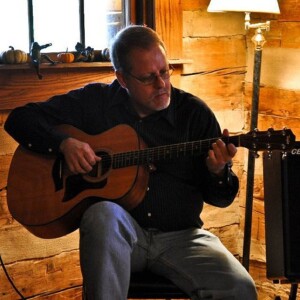
Tuesday Mar 14, 2023
Tuesday Mar 14, 2023
Veterinarian Dr. Gene Maxwell remembers someone coming up to him after a show in his town where he’d played some easy-going tunes on his guitar, influenced by folk, country, bluegrass, jazz, whatever. And she said his music was relaxing. He was elated inside. Because that’s what sitting and playing guitar does for him today: The tones of the guitar relax him like a feedback loop of calm.
He says everyone’s life at the veterinary hospital is better if he gets 20 minutes of guitar time in before showing up. And he’s never felt the pull to make his life all about the music. The guitars and the equipment to make those heart-pleasing tones sit around his house, and they’re there when he needs them.
Find out what music on the side feels like to this practice-owning animal doctor. Have you neglected that little itch inside to get some deep-down healing from a strum, a blow, a hum, a chant, a thump?
To Feed Further Curiosity:
You can listen to the first album from the band that included Dr. Maxwell, The Company I Keep on Spotify and other streaming services right now. If you want a physical copy of that CD or the follow-up album, they're available $10 each from Dr. Maxwell himself; email him at imbcreative@yahoo.com It would mean a LOT to me if at LEAST one listener bought them the way I did. They're some of the last CDs I bought and held onto ...
Dr. Maxwell has very helpfully put his released solo stuff from the past few years on ReverbNation here.
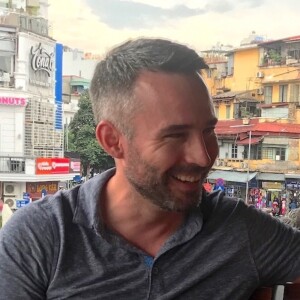
Tuesday Mar 07, 2023
Tuesday Mar 07, 2023
I mean, he doesn’t just study Xenophon. Dr. Gregory McBrayer teacher political philosophy and international relations as Director, Core Curriculum, and Assistant Professor of Political Science at Ashland University.
I’ve been on a kick lately reading excerpts from late-19th-early-20th century series. (Find my writing here.) And each time I wrap up a thinker, I thought, “Hey, wouldn’t it be neat if I talked to somebody who knows that thinker better to see if my impressions were right, what I missed, and what cool rabbit trails other people fall down when it comes to that thinker?”
And Dr. McBrayer very kindly agreed to answer some of my questions about Xenophon. The thinker seemed the most modern and readable to me, and Dr. McBrayer agrees. He loves Xenophon, which made this interview pop with enthusiasm for me. Especially interesting is his perspective on the ancient Greek. See, Xenophon was used by students for many, many years to learn and translate from. Why? It’s straight-forward. But Dr. McBrayer says, hey, sure, it’s straightforward and direct. And other folks think Xenophon was the “dumb jock” at the ancient Greek thinker table. But is there more to Xenophon than meets the eye? He sold me on it. Listen to the episode, and maybe you’ll be sold, too. We also talk American politics, touch on Plato and Aristotle, and have a good old time …
To Feed Further Curiosity:
A series of translations (Cornell University’s Agora Editions) of ancient and medieval works includes two Dr. McBrayer mentions. One is edited by him. The other he calls out as his favorite translation of Xenophon’s semi-fictional tale of Cyrus the Younger, which he recommends as folks’ gateway drug to the ancient Greek:
The Shorter Writings by Xenophon, edited by Dr. McBrayer with one selection translated by him
The Anabasis of Cyrus by Xenophon, translated by Wayne Ambler.
Dr. McBrayer co-hosts a podcast with two scholarly friends titled The New Thinkery. The discussion wanders from sarcastic ribbing, funny philosophical observations, and very in-depth looks at both philosophy most would consider obscure (medieval Islam, for instance) as well as takes on more familiar films and literature. If you like smart-people-discussion podcasts and don’t mind lots of philosophical digressions and wanderings, then scroll through the titles and find a book, movie or topic you’re interested in and try it out. Dr. McBrayer’s co-hosts include David Bahr (editor of The American Mind) and University of Colorado, Boulder, professor Dr. Alex Priou.
Dr. McBrayer is involved with the Ashbrook Center at Ashland University, “an independent, non-partisan nonprofit with the mission of restoring and strengthening the capacities of the American people for constitutional self-government.” The website teachingamericanhistory.org eats up some of Dr. McBrayer’s time in his quest with others to offer primary documents of American history and government for the world to read online.
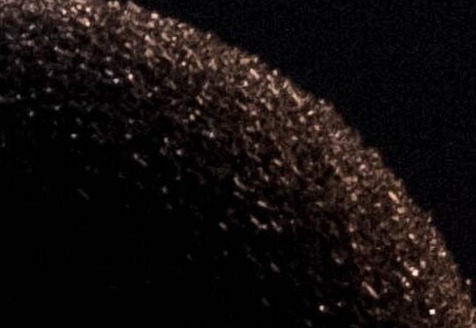
What People Do: Interviews of Discovery
When COVID happened, I started talking to friends, family and acquaintances about something they did. The topics, personalities, and conversational directions go many different ways, but the important thing remains the same: We are all worth the time it takes to sit down and talk a while to each other. What would you learn if you slowed down, asked more questions, and delved into something interesting to ... someone else?



